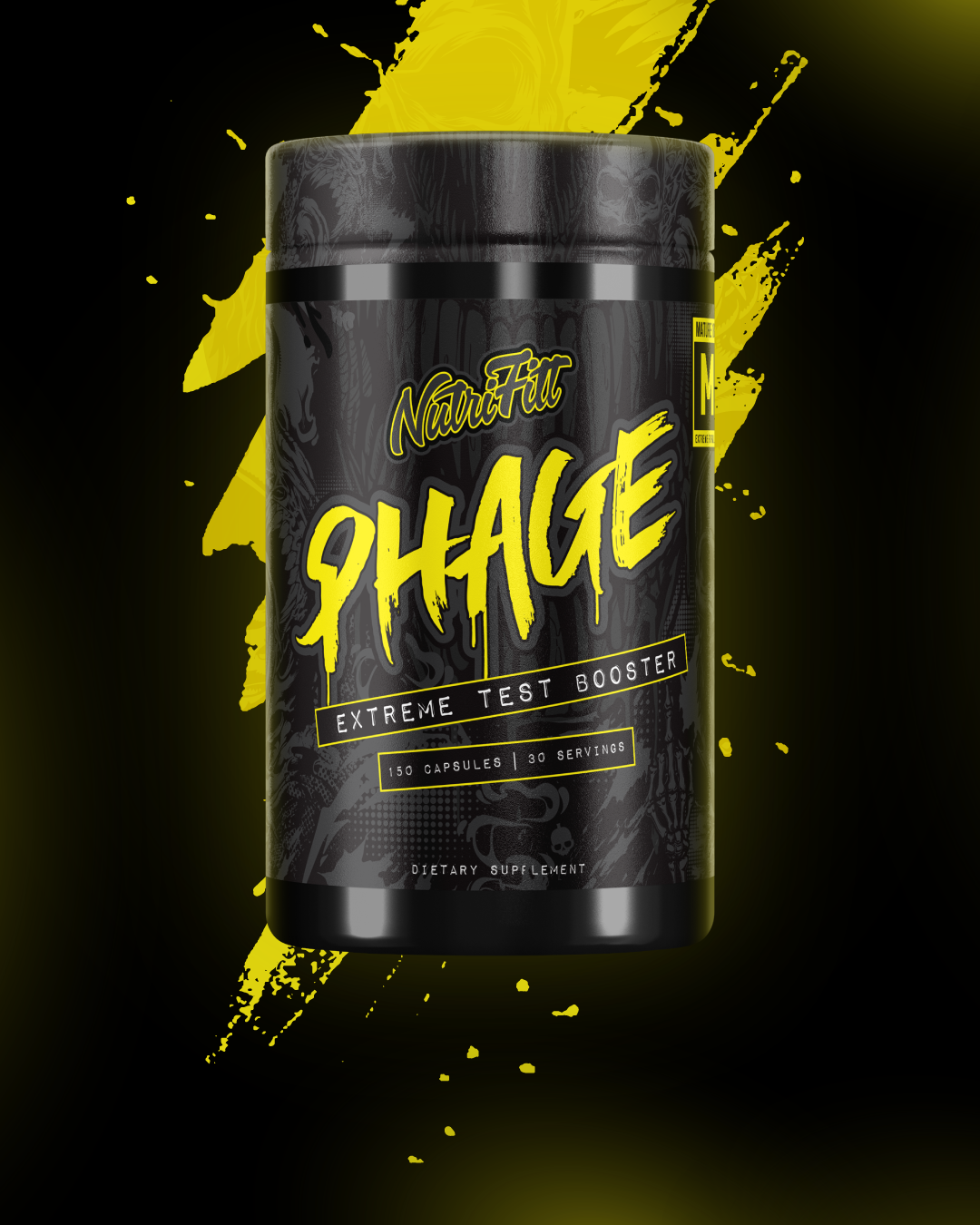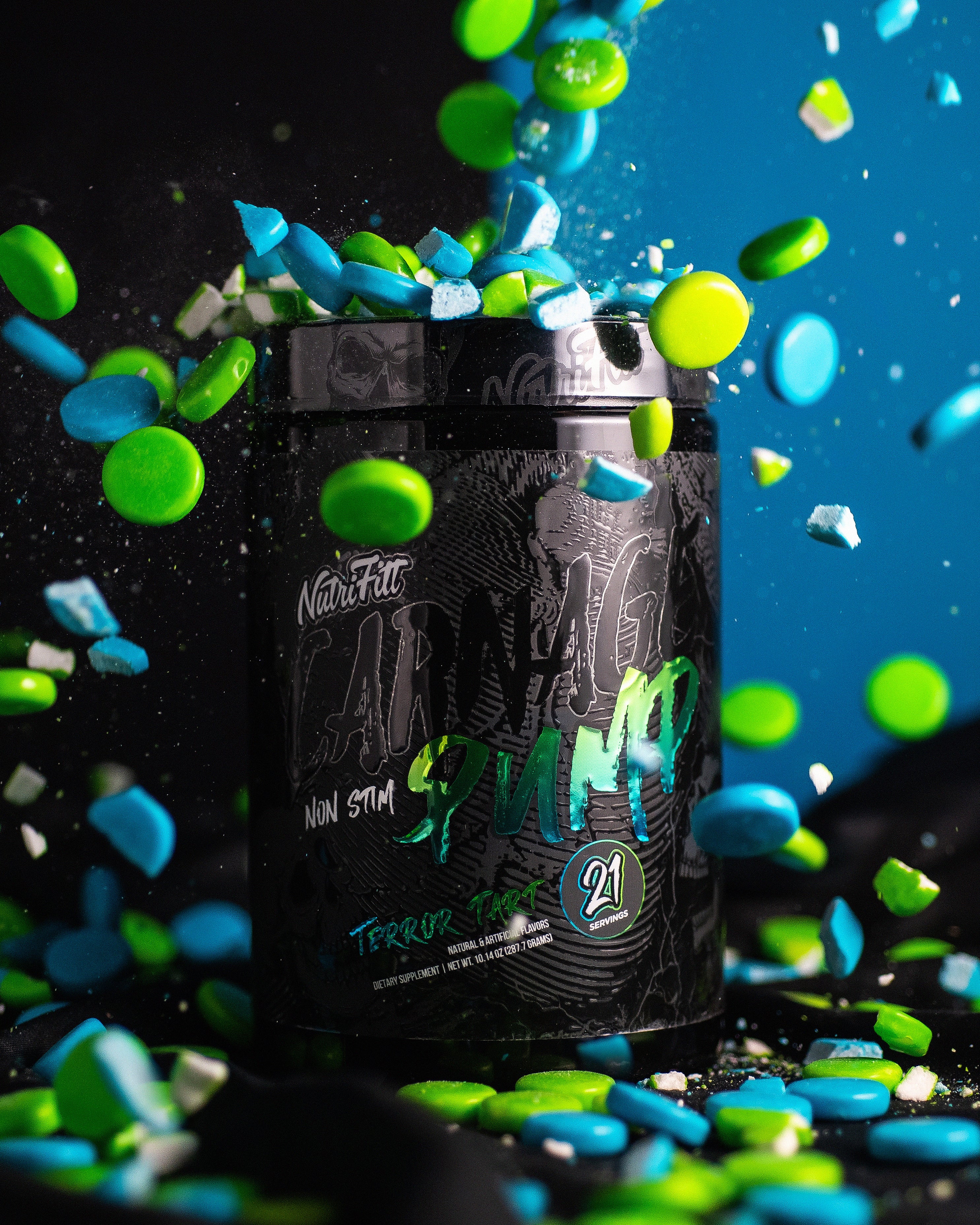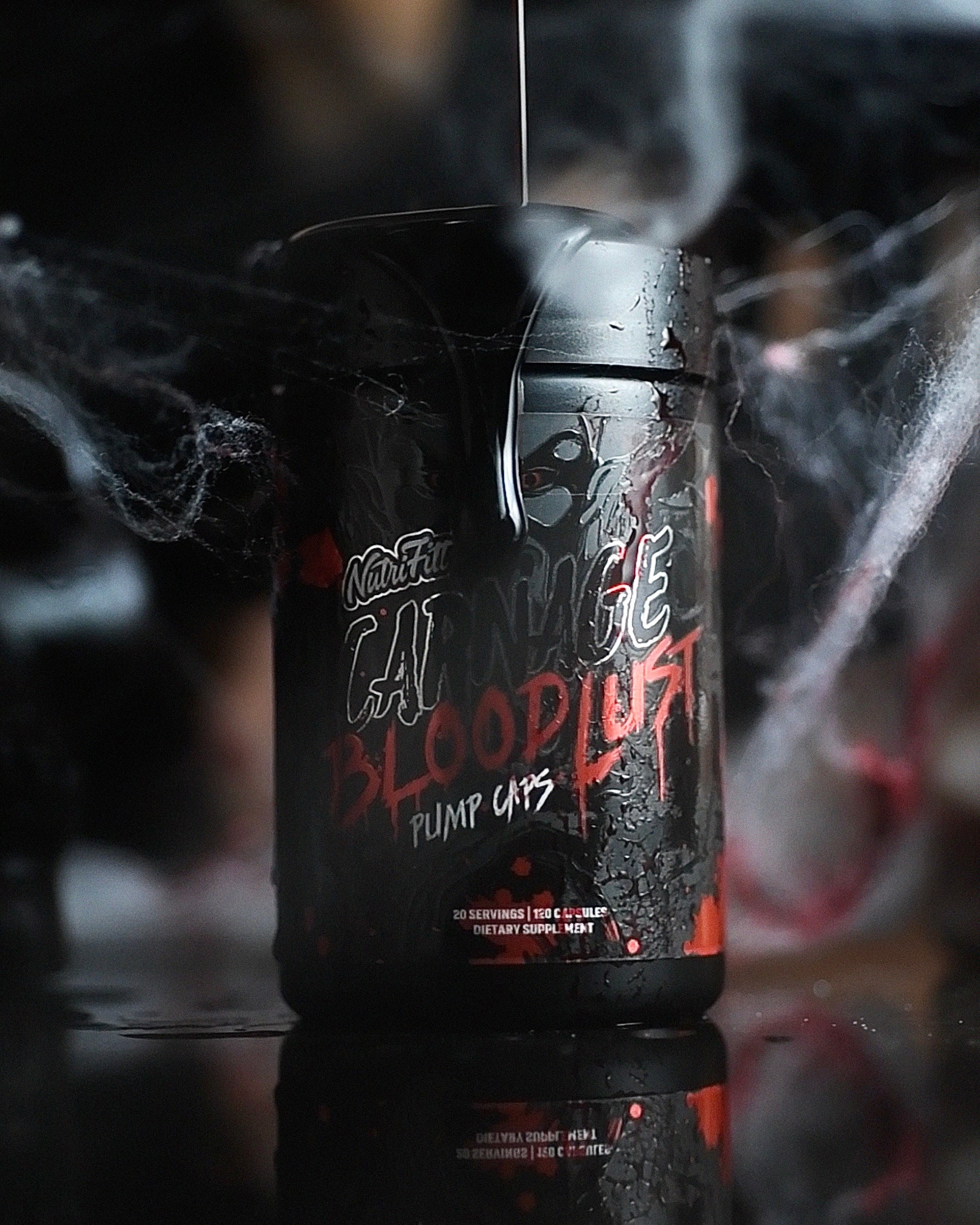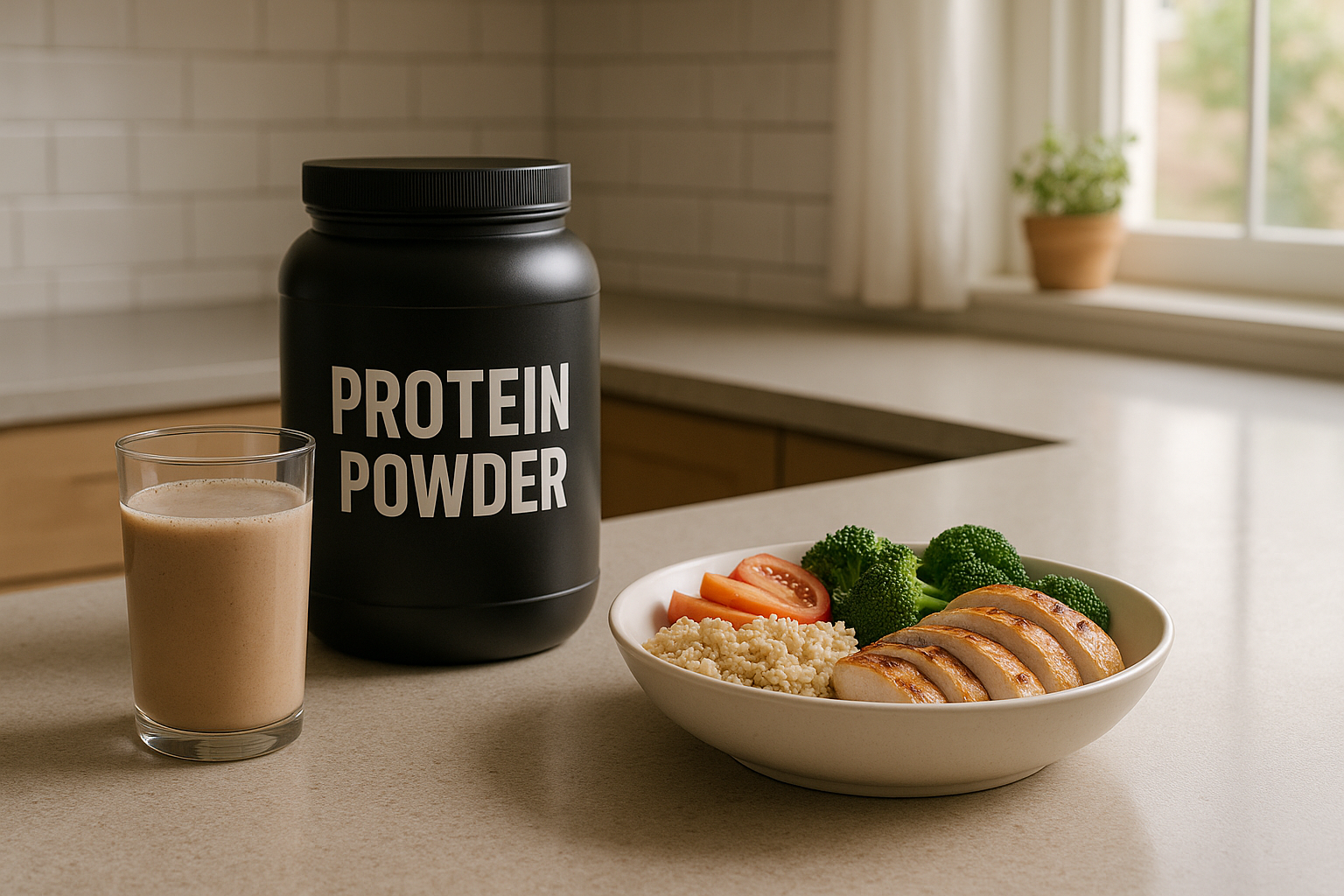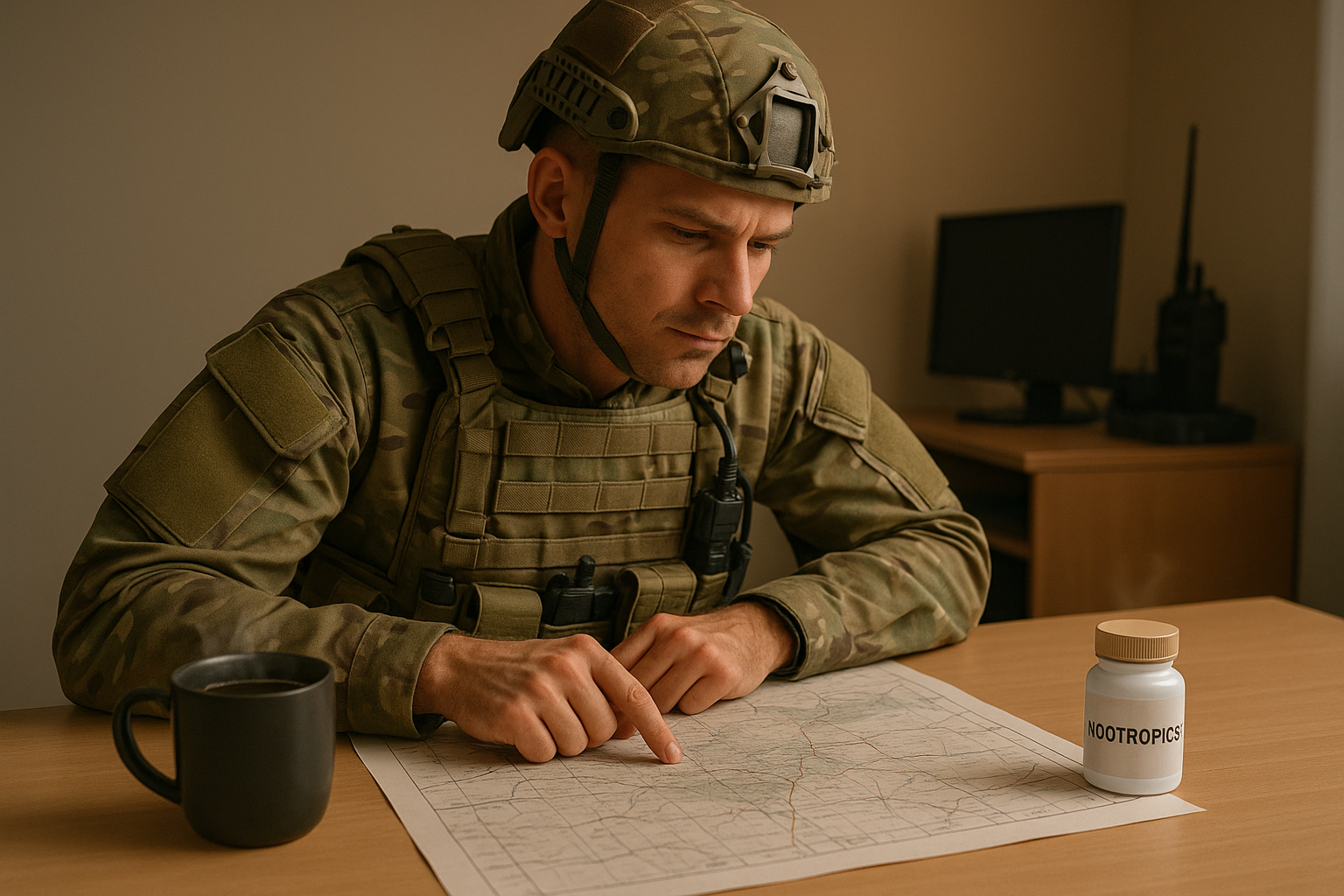
Military Nootropics: What Science Says
Can nootropics improve military performance? Research says yes, but with limits. Nootropics - substances that boost brain function - are gaining attention in military settings. They help with sleep deprivation, stress, and decision-making during high-stakes operations. Common options include caffeine, modafinil, tyrosine, and citicoline, each offering specific benefits like alertness, focus, and stress resistance. However, safety concerns and ethical considerations mean strict military guidelines regulate their use.
Key Takeaways:
- Caffeine: Quick alertness, lasts 3–5 hours.
- Modafinil: Long-lasting wakefulness, up to 15 hours.
- Tyrosine: Enhances focus under stress.
- Citicoline: Boosts attention and psychomotor speed.
Quick Comparison
| Nootropic | Onset | Duration | Primary Benefit | Military Use |
|---|---|---|---|---|
| Caffeine | 30–120 minutes | 3–5 hours | Rapid alertness | Approved |
| Modafinil | 2–4 hours | 12–15 hours | Sustained wakefulness | Restricted |
| Tyrosine | Varies | Stress-dependent | Focus and stress resistance | Approved |
| Citicoline | Varies | Varies | Attention and psychomotor speed | Approved |
Military nootropics have potential but require careful regulation to balance performance with safety. Always follow guidelines and consult medical professionals.
Research on Military Nootropics
Caffeine and Modafinil Studies
Military research highlights the cognitive benefits of both caffeine and modafinil. For instance, an Air Force study found that administering two 200 mg doses of caffeine, spaced 4 hours apart, helped maintain alertness during a 9-hour overnight reconnaissance mission simulation in a U‑2 aircraft [5].
Here’s a quick comparison of their characteristics:
| Characteristic | Caffeine | Modafinil |
|---|---|---|
| Onset | 30–120 minutes | 2–4 hours |
| Duration | 3–5 hours | 12–15 hours |
| Optimal Dose | 100–600 mg | 200 mg |
| Primary Benefits | Rapid alertness and improved reaction | Sustained wakefulness and longer-lasting effects |
"Caffeine definitely should be considered in developing performance-enhancing rations or ration components...a mechanism for including caffeine in another ration component - that can be selectively used when the situation requires - should be evaluated." - Institute of Medicine (US) Committee on Military Nutrition Research [6]
In addition to caffeine and modafinil, other compounds like tyrosine and citicoline have been studied for their potential tactical benefits.
Tyrosine and Citicoline Research
Research into tyrosine and citicoline has shown promising results, especially in high-stress scenarios. At the University of Bedfordshire, soccer players who took L‑Tyrosine before a 90‑minute test in 77°F conditions performed better in cognitive vigilance and reaction time compared to those given a placebo [10]. Similarly, military cadets who supplemented with 10 g of tyrosine daily during combat training maintained sharper focus and experienced lower blood pressure under extreme stress [7].
Citicoline has also demonstrated cognitive benefits:
- A 28-day supplementation improved attention and psychomotor speed [8].
- Combined with caffeine, it enhanced sustained attention and memory performance [8].
- A daily dose of 500 mg is recommended for optimal results [9].
Tyrosine stands out for its ability to support memory, focus, and processing speed in stressful environments [7].
These studies pave the way for exploring more advanced synthetic nootropics in military settings.
Noopept and Piracetam Effects
While caffeine, modafinil, tyrosine, and citicoline show well-documented benefits, synthetic nootropics like Noopept and Piracetam are still being studied for their potential roles in tactical decision-making [11]. Reports suggest a high reliance on cognitive supplements among military personnel [1], with Australian forces showing even higher usage rates [12]. However, more research is needed to understand how these compounds perform during high-stress, high-demand tasks [2].
Safety and Ethics
Safety Risks
The increasing use of nootropics in military settings brings up serious safety concerns, particularly regarding their long-term effects. Some studies reveal that certain nootropics might contain unapproved drugs or newly formulated dietary ingredients, raising red flags about their safety and regulation [14].
Here’s a breakdown of the primary safety risks:
| Risk Category | Immediate Effects | Long-term Concerns |
|---|---|---|
| Cardiovascular | Blood pressure changes | Potential heart disorders |
| Neurological | Brain fog, headaches | Unknown brain toxicity |
| Psychological | Anxiety, insomnia | Dependency, tolerance |
| Physical | Digestive discomfort | Broader health concerns |
Research conducted by German institutions underscores the growing trend of cognitive enhancer use. For instance, a 2016 study involving 1,021 economics professionals found that 19% reported using prescription or illicit drugs for cognitive enhancement. Among the most common substances were methylphenidate, amphetamine, and modafinil [13].
"Healthy individuals seeking to preserve or enhance their cognitive capabilities should avoid pharmacological cognitive enhancers and focus instead on a healthy and rewarding lifestyle." [13]
Military Ethics
With these safety risks in mind, the military enforces strict ethical protocols to regulate substance use. The Uniform Code of Military Justice (UCMJ) plays a key role in maintaining operational integrity and ensuring the safety of personnel.
Military guidelines on substance use are clear:
- Allowed: Natural supplements such as caffeine, L-Theanine, and omega-3 fatty acids.
- Restricted: Synthetic compounds, which require explicit approval.
- Permitted: FDA-approved substances for specific uses.
Ethical oversight is central to these protocols. Military medical professionals are required to secure written informed consent, thoroughly explain potential risks, and reject treatments that pose excessive dangers. They must also ensure compliance with military performance standards and weigh the long-term effects on personnel welfare. These measures aim to balance performance enhancement with the safety and well-being of service members, ensuring that no compromises are made to mission integrity or individual health.
Current Research and Future Directions
Brain Chemistry Research
Military research has taken a deep dive into how nootropics affect brain chemistry, especially in high-stakes combat scenarios. Some of the latest studies have uncovered important findings across key areas:
| Focus | Findings | Applications |
|---|---|---|
| Sleep Deprivation | Nootropic interventions like tyrosine and caffeine show potential for maintaining performance during sleep deprivation [3] | Useful for extended operations |
| Physical Exhaustion | Beta-alanine enhances power performance and speeds up marksmanship [3] | Improves combat effectiveness |
| Stress Resilience | Low DHA levels are linked to higher mental health risks; soldiers with the lowest levels had a 62% greater risk of suicide [1] | Helps mitigate combat-related stress |
The U.S. Army is actively exploring ways to enhance cognition through nutritional strategies, resilience training, and even nerve stimulation [12]. Meanwhile, DARPA has made strides in non-invasive neurotechnologies.
"High-resolution, nonsurgical neurotechnology has been elusive, but thanks to recent advances in biomedical engineering, neuroscience, synthetic biology, and nanotechnology, we now believe the goal is attainable" [17]
This research opens the door to understanding how combining multiple compounds might amplify their effects.
Combined Nootropics Research
Building on brain chemistry studies, military experts are now investigating how different nootropics work together. For example, a recent study found that 87% of U.S. military personnel consume caffeinated products weekly, with daily averages of 218 mg for men and 167 mg for women. Coffee (68%), sodas (42%), and energy drinks (29%) are the primary sources of caffeine [3].
Researchers are also exploring multi-compound approaches to optimize performance.
"For us [at the Royal Netherlands Air Force], it's very important that we do not want to force someone to take modafinil... it does not take away the fatigue itself. So most importantly, in order to combat fatigue, you still have to emphasise on rostering, scheduling" [16]
Key areas of focus include:
- Developing personalized nootropic solutions tailored to individual cognitive needs [18]
- Studying natural options like Rhodiola rosea for stress reduction [1]
- Exploring the combined effects of caffeine and L-tyrosine on cognitive performance [3]
As military technology evolves - particularly in robotics and artificial intelligence - research into cognitive enhancement is becoming even more critical. The increasing mental demands on soldiers are driving the need for cutting-edge strategies to optimize performance [3].
sbb-itb-7567710
Usage Guidelines
Military Dosage Guide
Military personnel require precise dosing of nootropics to ensure both safety and optimal performance. Below are recommendations for commonly used, military-approved nootropics based on research:
| Nootropic | Standard Dosage | Maximum Daily Limit | Best Usage Timing |
|---|---|---|---|
| Caffeine | 100–200 mg | 600 mg | Every 2–4 hours during operations |
| Tyrosine | 150 mg/kg body weight | Varies by individual | Pre-mission or morning |
| Modafinil* | 400 mg | 400 mg | Single dose before extended operations |
*Modafinil use requires both a prescription and command approval.
"At the doses tested, caffeine, dextroamphetamine, and modafinil are equally effective for approximately 2–4 h in restoring simple psychomotor performance and objective alertness" [19].
Key Guidelines:
- Monitor Intake: Keep track of caffeine consumption, especially since U.S. personnel average between 212–285 mg/day [20].
- Stay Hydrated: Increase water intake when using nootropics to avoid dehydration.
- Cycle Usage: Follow a 5-on/2-off schedule to reduce the risk of tolerance.
- Consult Command: Always ensure compliance with military regulations [15].
These dosage recommendations serve as a foundation for selecting and scheduling supplements in line with military standards.
Available Products
When choosing supplements, it’s important to select products that align with military guidelines. Below are examples of natural components that meet these standards:
| Component | Benefits | Military Application |
|---|---|---|
| L-Theanine | Reduces stress | Supports calmness before missions |
| Omega-3 | Promotes brain health | Helps with daily cognitive maintenance |
| Citicoline | Improves focus | Enhances performance during training and operations |
Guidelines for Use:
- Timing: Split doses between morning (to boost alertness) and evening (to aid recovery).
-
Safety:
- Ensure all supplements comply with the UCMJ (Uniform Code of Military Justice).
- Report any adverse effects immediately.
- Keep up with regular medical checkups to monitor health.
- Cycling: Adhere to cycling protocols to prevent tolerance buildup.
Synthetic racetams have been prohibited in military settings since 1960 [15]. For approved options, NutriFitt's CODEX Nootropic offers a compliant formula containing citicoline and tyrosine, designed to enhance cognitive performance during demanding operations.
Dave Asprey Explains how Nootropics Enhance Cognitive Function | MOONSHOTS
Conclusion: Military Nootropics Overview
Military nootropics show potential but come with important considerations. Traditional options like caffeine and L-tyrosine have proven to be reliable in military applications [4]. On the other hand, many supplements still lack strong scientific backing. For instance, a 30-day trial of the Alpha Brain® supplement showed no significant improvements in marksmanship, mood, or stress among active-duty soldiers [2].
Benefits and Limitations
While traditional nootropics like caffeine and L-tyrosine stand out for their consistent benefits [4], many other supplements fail to deliver the same level of reliability. This highlights the need for rigorous safety protocols and evidence-based approaches before incorporating new substances into military settings.
Safety and Regulatory Framework
The mixed results from nootropics underscore the importance of strict safety and regulatory measures. Military regulations ensure that only FDA-approved substances are permitted, excluding synthetic alternatives like Racetams, which have been banned since 1960 [15]. These regulations are designed to protect service members while maintaining operational readiness. Here's how the framework operates:
| Aspect | Status | Impact |
|---|---|---|
| Regulatory Compliance | FDA-approved substances only | Provides clear usage guidelines |
| Safety Standards | Governed by UCMJ protocols | Minimizes risks of adverse effects |
| Performance Monitoring | Regular medical oversight | Ensures readiness and effectiveness |
This strict oversight ensures safety but also emphasizes the need for further research to improve the effectiveness of nootropics in military contexts.
Future Research Direction
To address the unique cognitive demands of military operations, future research must focus on specific challenges faced by service members. As Nicholas Barringer points out, the growing interest in nootropics necessitates studies that evaluate their effects on critical military tasks [2]. Additionally, health experts caution against supplements like L-arginine, beetroot juice, and beta-alanine due to insufficient evidence supporting their efficacy and safety [1].
In the high-pressure environment of military operations, finding the right balance between safety and effectiveness remains a top priority for researchers and decision-makers alike.
FAQs
What ethical issues arise from using nootropics in military settings?
The use of nootropics in military settings brings up some serious ethical questions. A major concern revolves around autonomy and consent. Service members might feel obligated to take these substances to meet demanding performance standards, even if they're uncertain about the potential risks or long-term consequences. This pressure could undermine their ability to make truly informed choices.
Another pressing issue is the uncertainty surrounding safety and health effects. Since the long-term impact of nootropics remains unclear, it's crucial to carefully balance the potential cognitive advantages with the risks they may pose to both mental and physical health. To navigate these challenges, implementing strict ethical guidelines and regulatory measures is essential to safeguard the rights and well-being of those in uniform.
How can nootropics like tyrosine and citicoline support military personnel in high-stress situations?
Nootropics like tyrosine and citicoline can be incredibly helpful for military personnel operating in high-stress situations. Tyrosine plays a key role in producing neurotransmitters such as dopamine and norepinephrine. These chemicals are vital for keeping focus, improving memory, and maintaining mental adaptability under prolonged stress. This means that even in intense environments, individuals can stay alert and responsive.
Meanwhile, citicoline works by boosting brain energy and speeding up information processing. It sharpens mental clarity and enhances decision-making - skills that are absolutely essential for tactical professionals dealing with complex, high-pressure scenarios. When combined, these nootropics help reduce cognitive fatigue and stress, ensuring better focus and mental resilience in the field.
What are the long-term safety concerns of using nootropics in the military?
The long-term use of nootropics in the military comes with a variety of concerns. One major issue is the risk of dependency, which could lead to withdrawal symptoms or even alter brain chemistry in ways that might impair cognitive function over time. There’s also the possibility of side effects like mood disorders, heightened anxiety, and elevated stress levels, all of which could impact a soldier's mental health and performance.
Another challenge is the lack of extensive research on the long-term effects of these substances. Without a clear understanding, there could be hidden health risks that remain undetected. On top of that, ethical questions loom large - how might these performance-enhancing substances affect soldiers' well-being or their ability to handle high-pressure situations? These uncertainties underscore the importance of thorough research and careful deliberation before nootropics become a standard tool in military operations.




